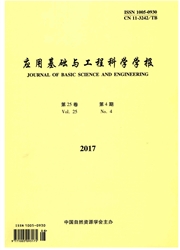

 中文摘要:
中文摘要:
开展未来气候情景下海河流域参考蒸发蒸腾量的预估研究,揭示流域未来气候变化背景下的水文响应规律,有助于更好地为水资源分配和管理提供科学基础和理论依据.根据海河流域及其周边共40个气象站1961-2010年逐日气象资料,基于FAOPenman—Monteith法计算参考蒸发蒸腾量(RET),通过统计降尺度模型(SDSM)实现HadCM3输出RET数据网格到站点的尺度降解,进而生成未来情景下RET并分析其时空变化规律.结果表明,基于SDSM模型的模拟效果较好,可以用于未来情景下海河流域GCM输出RET的降尺度应用;虽然过去50年流域大部分站点的RET年值呈下降趋势,但SDSM模型预测的未来气候情景下大部分区域却呈增加的趋势,其中H3A2情景下增加量略高于H382情景,且随着时间的推移增加量越来越大,以流域西北部边缘区域、滦河上游和下游以及徒骇马颊河流域的增加趋势最为明显,RET减少的区域在2020s时期主要位于流域中部,随着时间的推移逐渐缩小到京津塘地区;RET季节值的变化同样具有很强的时空特性,而除了春季时在流域南部、秋季在2020s时期滦河流域下游和海河北系的东部部分区域、冬季在流域的西南部和东北部RET呈减小趋势外,其余RET则主要呈增加的趋势;同时研究表明未来情景下RET增加主要由温度的上升导致.
 英文摘要:
英文摘要:
Estimating reference evapotranspiration ( RET ) under the future climate scenarios, and further revealing the hydrological response to the future climate change, are helpful to provide scientific and theoretical basis for water resources planning and management. In this study, RET was calculated using FAO Penman-Monteith method during the period 1961--2010 according to the daily meteorological data of 40 stations across the Haihe River Basin. The projected daily RET of HadCM3 under A2 (H3A2)and B2 (H3B2)scenarios were downscaled to local meteorological stations using the statistical downscaling model (SDSM). Spatial and temporal patterns of RET in the future ( 2011--2099 ) were analyzed. The results show that, the SDSM model performs well in simulating RET in the Haihe River Basin. Although the RET of most stations declined during the past 50 years,projected future RET in most areas would increased,especially in the northwestern edge of the area, Luanhe River upstream and downstream, and Tuhaimajiahe River Basin. The increase amount of RET under H3A2 would be slightly higher than that under H3B2. The decrease of RET could mainly be expected in the central basin in 2020s, with gradually shrinking to the Jing-Jin-Tang region. Furthermore, spatial and temporal heterogeneities could be found in changes in seasonal RET. Seasonal RET would increase in most regions of the Haihe River Basin, except spring RET in the southern river basin, the autumn RET in Luanhe River downstream and northeastern of the Haihe River Basin, and the winter RET in the southwest and northeast of the basin. Meanwhile, the future increasing temperature should be mainly responsible for the increasing RET on the whole basin.
 同期刊论文项目
同期刊论文项目
 同项目期刊论文
同项目期刊论文
 Characterizing the changing behaviors of precipitation concentration in the Yangtze River Basin, Chi
Characterizing the changing behaviors of precipitation concentration in the Yangtze River Basin, Chi Estimating the Effects of Climatic Variability and Human Activities on Streamflow in the Hutuo River
Estimating the Effects of Climatic Variability and Human Activities on Streamflow in the Hutuo River Spatial and Temporal Characteristics of Reference Evapotranspiration Trends in the Haihe River Basin
Spatial and Temporal Characteristics of Reference Evapotranspiration Trends in the Haihe River Basin Quantitative assessment of the impact of climate variability and human activities on runoff changes:
Quantitative assessment of the impact of climate variability and human activities on runoff changes: Changes in reference evapotranspiration across the Tibetan Plateau: Observations and future projecti
Changes in reference evapotranspiration across the Tibetan Plateau: Observations and future projecti 期刊信息
期刊信息
